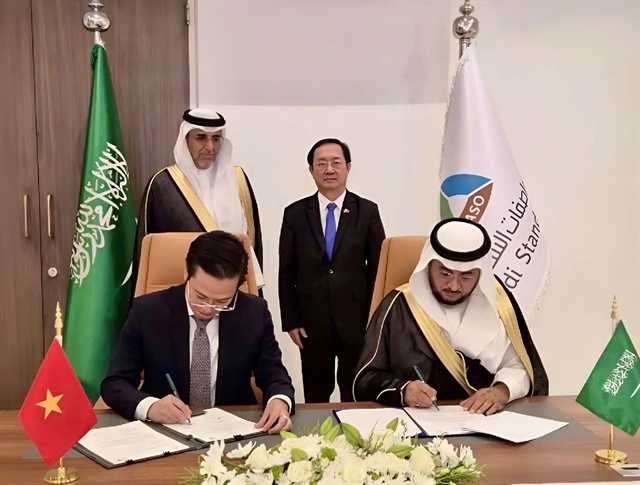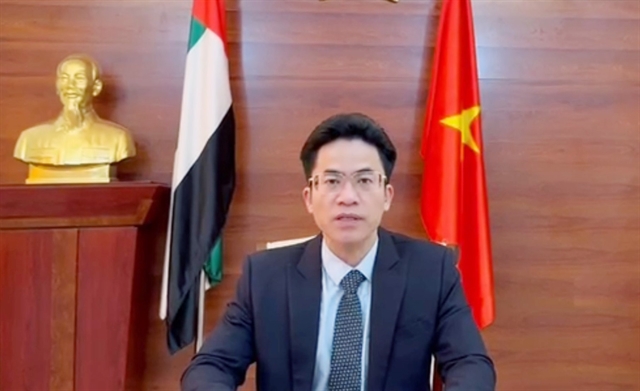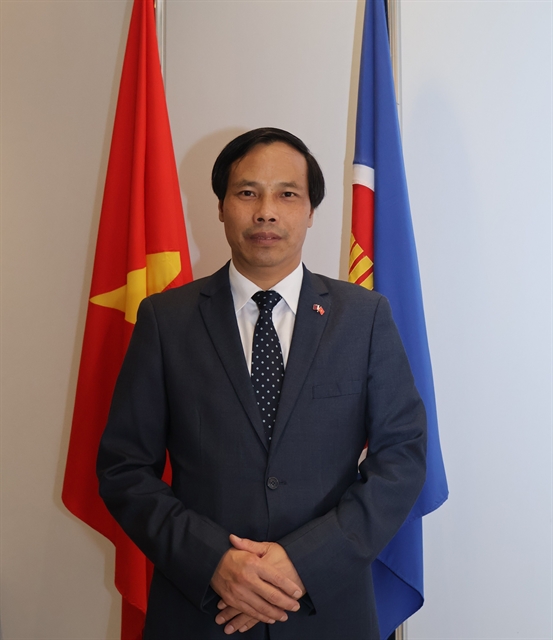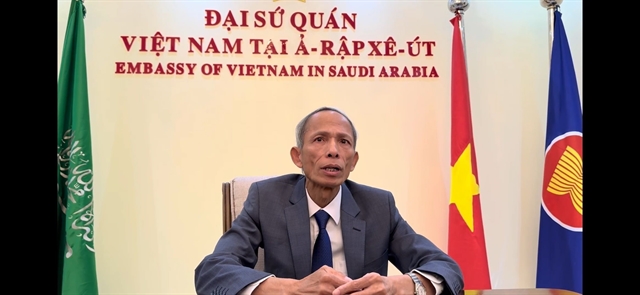 Politics & Law
Politics & Law

 |
| Processing oyster at the Lenger Seafood Vietnam Co. Ltd in northern Nam Định Province. The company's processing assembly was granted Halal certificate. — VNA/VNS Photo Vũ Sinh |
Việt Nam and the Middle East have enjoyed a longstanding cooperative relationship, marked by mutual respect and economic exchange. This foundation has not only supported consistent trade but also holds substantial potential for expansion.
With Prime Minister Phạm Minh Chính’s recent visit to the Middle East, a fresh momentum has been established, setting the stage for enhanced trade relations, deeper economic ties, and new areas of cooperation.
Complementary relationship
Experts point out that the Middle East and Việt Nam have highly complementary economies, which can lead to beneficial partnerships across various sectors. Saudi Arabia, the largest economy in the Gulf Cooperation Council (GCC) region, is a key economic partner of Việt Nam.
Because of vast desert areas and a challenging agricultural climate, Saudi Arabia looks to imports for its food security, making Việt Nam’s agricultural and seafood products highly attractive. This includes staples like rice, coffee, cashew nuts, tea, and frozen fish, which align well with Saudi Arabia’s growing demand for diversified food sources.
Saudi investors are also exploring potential in Việt Nam’s agriculture, food processing, and textile sectors.
As of 2022, Việt Nam’s trade with Saudi Arabia had grown to nearly US$2.7 billion, with Việt Nam exporting products like mobile phones, textiles, wood products, and machinery, while importing raw materials such as plastics, chemicals and animal feed from Saudi Arabia.
Additionally, Saudi Arabia currently has eight investment projects in Việt Nam, valued at US$8.57 million, and the Saudi Fund for Development has extended preferential loans to 12 projects totalling over $164 million. These initiatives reflect the Middle Eastern nation’s interest in expanding its economic footprint in Việt Nam.
The UAE is another prominent economic partner, serving as Việt Nam’s largest export market in the Middle East and Africa. In the first nine months of this year, trade between the two countries reached $4.96 billion, already surpassing the $4.7 billion recorded for the whole of 2023.
The two nations have an ambitious target of reaching $10 billion in bilateral trade, with Việt Nam’s exports comprising mobile phones, electronics, footwear, textiles, and agricultural products such as pepper, cashew nuts, and rice. Imports from the UAE include plastic materials, liquefied natural gas, and petroleum products, underscoring the mutual benefits of these trade flows.
Meanwhile, Qatar, with its strong focus on energy and finance, presents lucrative opportunities for Việt Nam.
In 2023, Việt Nam-Qatar trade reached $497 million, marking a 32 per cent increase from the previous year. Việt Nam primarily exports seafood, electrical equipment, wood products, and electronics to Qatar, while importing LPG, raw plastics, and chemicals.
With Qatar’s focus on diversifying its investment portfolio, sectors such as real estate, industry, and education show promise for future collaboration.
 |
| Vinfast vehicle models on display in UAE. VNA/VNS Photo Dương Giang |
Unlocking potential
At a recent business-to-business (B2B) event in Hà Nội, Trần Thanh Hải, deputy director general of the Agency for Foreign Trade under the Ministry of Industry and Trade, underscored the complementary economic relationship between Việt Nam and the Middle East, highlighting Việt Nam’s strong positions in agriculture, industry, and manufacturing, which align well with the needs of the Middle East.
While Việt Nam’s primary exports to the region have included rice, coffee, pepper, and seafood, there remains significant room to expand into additional categories such as electronics, apparel, and household goods, particularly in countries with young populations and growing middle classes, according to Hải.
“Việt Nam has strengths in key export areas that are well-suited to the demands of Middle Eastern markets,” Hải said.
He noted the high demand for halal-certified goods, especially processed foods, cosmetics, and pharmaceuticals in Middle Eastern and North African countries, particularly in the GCC, given their significant Muslim populations.
Despite the opportunities, Việt Nam currently faces some challenges in penetrating the Middle Eastern market more deeply, according to Hải. Investment from the Arab region represents less than 1 per cent of total foreign direct investment (FDI) in Việt Nam, with capital from these countries accounting for only 0.21 per cent of the total.
These figures remain modest and do not fully reflect the cooperation potential between Việt Nam and the Middle East.
With a strategic location in Southeast Asia, Việt Nam has the potential to develop as a transit hub for goods between Asia and the Middle East. Collaboration with leading logistics companies in the region, such as DP World in Dubai, could enhance connectivity, improve supply chain efficiency, and strengthen trade links between Southeast Asia and the Middle East.
Leading Middle Eastern corporations, including BW Group, are investing in Việt Nam’s logistics and maritime sectors, which Hải sees as critical for advancing Việt Nam’s position as a trade and logistics hub.
These efforts align with Saudi Arabia’s Vision 2030 initiative, which aims to establish Saudi Arabia as a premier logistics hub connecting Asia, Europe and Africa.
For Vietnamese logistics firms, Vision 2030 represents a valuable opportunity for partnerships that could elevate Việt Nam’s logistical capabilities and trade potential with the Middle East and beyond. — VNS
 |
| Vietnamese Ambassador to the UAE Nguyễn Thanh Diệp. — VNA/VNS Photo |
Vietnamese Ambassador to the UAE Nguyễn Thanh Diệp:
High shipping costs and fierce competition from India and Pakistan are big challenges for Vietnamese enterprises to enter the UAE market.
The establishment of a Vietnamese business association in the UAE will provide information and consultations for enterprises to minimise trade disputes and fraud.
A joint working group should be set up to share information and connect potential projects and partners between the two sides as well as promote UAE investment in areas of Việt Nam’s strengths like renewable energy, oil and gas, logistics, real estate, energy and industrial infrastructure, and industrial waste treatment.
Following the signing of the Comprehensive Economic Partnership Agreement, the ties between Việt Nam and the UAE across all areas will continue thriving in the future. Elaborating the agreement, the first free trade pact that Việt Nam has ever negotiated with an Arabic nation in the Middle East, will open up great prospects and a new period of strategic cooperation between the two countries.
 |
| Vietnamese Ambassador to Qatar Nguyễn Huy Hiệp. — VNA/VNS Photo |
Vietnamese Ambassador to Qatar Nguyễn Huy Hiệp:
Energy and renewable energy is a key area of cooperation between Việt Nam and Qatar. With abundant oil and gas resources as financial and technological potential, Qatar can join hands with Việt Nam in technology transfer and energy projects, especially in renewables.
Việt Nam has recently approved a plan on strengthening international cooperation to build and develop its halal industry by 2030 -- the first setting out a major national direction to open up the potential halal market with Islamic countries, while Qatar has introduced the Halal Livelihoods programme aiming to establish itself as a global hub for halal products in the near future.
In education and research, the potential for exchange programmes for students and lecturers, as well as joint scientific research, could enhance the competitiveness and capabilities of both countries.
The two nations should hold cultural exchanges and tourism promotion events to raise mutual understanding and collaboration.
 |
| Vietnamese Ambassador to Saudi Arabia Đặng Xuân Dũng. — VNA/VNS Photo |
Vietnamese Ambassador to Saudi Arabia Đặng Xuân Dũng:
Việt Nam and Saudi Arabia have established fundamental cooperation mechanisms to enhance bilateral relations, including the Joint Committee on Economic, Scientific, and Technical Cooperation and political consultations between their foreign ministries.
In addition to the existing Double Taxation Avoidance Agreement, both countries are actively working to improve and solidify cooperation mechanisms, agreements, and memorandums of understanding at the government, ministerial, and sectoral levels. This effort aims to enhance the legal framework for bilateral relations, facilitating economic and trade cooperation for localities and businesses with Saudi Arabia.
The two parties, however, should consider establishing additional cooperation mechanisms, such as the Việt Nam-Saudi Arabia Business Council, to further strengthen bilateral economic and trade relations. This council would allow businesses from both parties operating in similar fields to connect directly and explore investment and collaboration opportunities.




